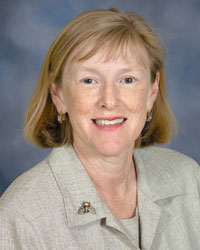
NOTE: This profile is part of a series highlighting the 25 researchers who were named UNMC Distinguished Scientists for 2006. Each of these researchers will be profiled in UNMC Today leading up to a March 12 ceremony to recognize their achievements.
- Name: Ann Berger, Ph.D.
- Title: Niedfelt Professor and Advanced Practice Nurse-Oncology, College of Nursing
- Joined UNMC: 1971-74, 1984-present
- Hometown: Boston
Q) Describe your research in 25 words or less.
A) My research focuses on cancer-related fatigue. I use wrist actigraphy monitors to examine sleep, activity and circadian rhythms to determine their relationship to fatigue in patients.
Q) How did you decide to pursue this area of research?
A) I pursued cancer symptom management and survivorship research because as a clinical nurse, patients I observed were experiencing frequent, intense and distressing symptoms related to cancer and cancer treatment. As a nurse, my role is to assist patients in responding to the side effects of disease and treatment. Effective symptom management promotes quality of life during and after cancer treatment.
Q) When did you realize you were interested in research?
A) I realized I was interested in research while pursuing my master of science in nursing degree.
Q) What are the greatest challenges in research today?
A) One of the greatest challenges in oncology nursing research today is enrolling an adequate number of participants in symptom management research trials. Most cancer treatment trials are conducted at multiple national sites through large, well-organized cooperative trials groups. However, at this time, most symptom management trials are conducted at single sites and require an independent researcher to establish collaboration with each oncology practice clinic in order to recruit patients. National efforts are currently underway to establish multi-site nursing research trial groups.
Q) Best advice for new researchers?
A) My best advice for new researchers is to immerse yourself in an area in which you are passionate and that will sustain you through the ups and downs. I also advise a new researcher to find a mentor, who is someone willing to dialogue and guide you in becoming a scientist.
Q) When an experiment stalls, what drives you to continue on?
A) When a clinical study stalls, I continue on because I appreciate that life is always changing and slow times are usually followed by very busy times. I like to problem-solve a situation and strategize how to get things moving forward again.
Q) Who has been your greatest teacher?
A) My greatest teacher has been Susan Noble Walker, Ed.D., who has also been named a 2006 UNMC Distinguished Scientist. She has been my mentor for 15 years and has guided me in all aspects of my development as I grew from being a doctoral student to a novice to a senior scientist.
Q) Tell us about your family and hobbies outside the lab.
A) My family has been very instrumental in my personal and professional growth. My husband Tom and I share a love of family, friends and sports. Our daughter, Alison, lives in Lawrence, Kan., and we share a love of the arts and music. Our son, Greg, lives in Omaha with his wife, Amy, and we share the joy of watching our 2-year-old granddaughter, Elizabeth, with them. Both Tom and I come from large, supportive families who live in Nebraska and other states. There are frequent opportunities to get together with them.
Q) Globally, describe the most notable research achievement ever?
A) I would select the development of the polio vaccine as one of the most notable research achievements ever. I have had friends with polio and recognize how important the vaccine was in wiping out that serious, debilitating, and symptomatic disease.
Q) Clarify a common misconception about research?
A) A common misconception about clinical research is that patients are “guinea pigs.” The truth is that the risk/benefit ratio of each clinical trial is carefully reviewed. The consent form of studies that are offered to patients outlines the risks and the benefits. Most studies are conducted to test a new treatment or symptom management intervention compared to current standard practice. A patient who participates in a clinical research study may be monitored more frequently and may benefit from this additional monitoring.
Q) What would you tell a student interested in a research career?
A) I would tell a student who is interested in a health care research career that being a scientist is challenging, but rewarding. Researchers need to generate new ideas and test their ideas. Over time, it is hoped that researchers will advance knowledge in an area and this will transfer into improved health care.
Q) List three things few people know about you.
A) Love music, dancing and live theatre; have lived in nine U.S. states, including both coasts and love the Heartland; my family (Malone) is originally from County Kildare, Ireland. I have visited distant cousins (we share the same great grandmother) twice and would love to return!